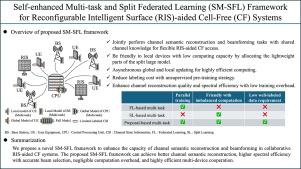Self-enhanced multi-task and split federated learning framework for RIS-aided cell-free systems
IF 6
3区 计算机科学
Q1 COMPUTER SCIENCE, INFORMATION SYSTEMS
引用次数: 0
Abstract
Collaborative learning-based beamforming schemes have been exploited to improve spectral efficiency (SE) with low privacy risks in reconfigurable intelligent surface (RIS)-aided cell-free (CF) systems. However, a single-task-driven federated learning (FL) scheme needs to run a large model on local devices with limited computing capacity due to its imbalanced computing resources. Although a single-task-driven split learning (SL) can split a large model into multiple smaller portions, it concerns the training time overhead due to its relay-based training. Meanwhile, annotation for well-labeled channel state information (CSI) still affects beamforming performance with high labeling costs. In this paper, we first propose a collaborative learning framework, named multi-task and split federated learning (M-SFL), for joint channel semantic reconstruction and beamforming for RIS-aided CF systems. The proposed M-SFL framework simultaneously tackles channel semantic reconstruction and beamforming with shared knowledge to distinguish the inherent information of user equipments (UEs). The proposed M-SFL splits large model into multiple lightweight parts friendly with the limited computing local devices and trains local and global models parallelly with the Federated server. Then, we expand the proposed M-SFL framework into a self-enhanced multi-task and split federated learning (SM-SFL) framework by integrating the contrastive learning technique. The SM-SFL framework pre-trains by predicting and distinguishing the target CSI and others without annotation, and then we fine-tune the local and global models with limited labeled CSI. Simulation results show that the proposed framework can jointly achieve better channel semantic reconstruction and higher SE with balanced computing resources, faster beamforming, and low labeling costs.

用于 RIS 辅助无细胞系统的自增强多任务和分裂联合学习框架
在可重构智能表面(RIS)辅助的无小区(CF)系统中,基于协作学习的波束成形方案被用来提高频谱效率(SE),同时降低隐私风险。然而,由于计算资源不平衡,单任务驱动的联合学习(FL)方案需要在计算能力有限的本地设备上运行大型模型。虽然单任务驱动的拆分学习(SL)可以将大型模型拆分成多个较小的部分,但由于其基于中继的训练,因此会造成训练时间的开销。同时,对标记良好的信道状态信息(CSI)进行标注仍会影响波束成形性能,且标注成本较高。在本文中,我们首先提出了一种协作学习框架,命名为多任务和分裂联合学习(M-SFL),用于 RIS 辅助 CF 系统的联合信道语义重建和波束成形。所提出的 M-SFL 框架利用共享知识同时处理信道语义重建和波束成形问题,以区分用户设备(UE)的固有信息。所提出的 M-SFL 利用计算能力有限的本地设备将大型模型友好地分割成多个轻量级部分,并与联邦服务器并行训练本地和全局模型。然后,我们通过整合对比学习技术,将所提出的 M-SFL 框架扩展为自我增强的多任务和拆分联合学习(SM-SFL)框架。SM-SFL 框架通过预测和区分目标 CSI 和其他无标注的 CSI 进行预训练,然后利用有限的标注 CSI 对局部和全局模型进行微调。仿真结果表明,所提出的框架可以在计算资源均衡、波束成形更快、标注成本更低的情况下,共同实现更好的信道语义重建和更高的 SE。
本文章由计算机程序翻译,如有差异,请以英文原文为准。
求助全文
约1分钟内获得全文
求助全文
来源期刊

Internet of Things
Multiple-
CiteScore
3.60
自引率
5.10%
发文量
115
审稿时长
37 days
期刊介绍:
Internet of Things; Engineering Cyber Physical Human Systems is a comprehensive journal encouraging cross collaboration between researchers, engineers and practitioners in the field of IoT & Cyber Physical Human Systems. The journal offers a unique platform to exchange scientific information on the entire breadth of technology, science, and societal applications of the IoT.
The journal will place a high priority on timely publication, and provide a home for high quality.
Furthermore, IOT is interested in publishing topical Special Issues on any aspect of IOT.
 求助内容:
求助内容: 应助结果提醒方式:
应助结果提醒方式:


